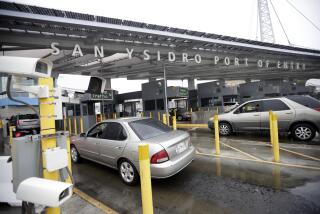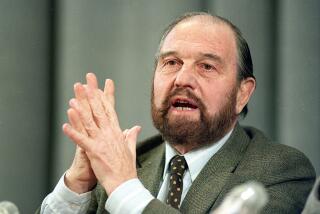George Denies Lying to Iran-Contra Panels : Trial: The former CIA spymaster says he was too preoccupied by other world events to have committed perjury or obstructed Congress.
- Share via
WASHINGTON — Former CIA spy chief Clair E. George, describing a career of worldwide espionage that risked his life and endangered his family, vehemently denied Wednesday that he had lied during official inquiries into secret arms sales to Iran and illegal aid to rebels in Nicaragua.
On trial on nine counts of perjury, obstruction and false statements, George replied with an emphatic “I did not” each time defense attorney Richard A. Hibey read a charge and asked if he had committed the offense.
His responses varied only to dismiss one accusation as “a lie” and another as “absolutely false.”
As if to convince the jury that he had simply been too preoccupied by other matters to have committed Iran-Contra crimes, George told of being responsible for other problems around the world at the same time the events now known as the Iran-Contra scandal took place.
He testified that when the secret arms deal was unfolding in 1985-86 he was working to thwart hostage-taking in the Mideast, handling “truly unbelievable” spy defections and redefections, dealing with Israeli espionage and trying to determine the fate of CIA Beirut station chief William Buckley, who was kidnaped, tortured and died while in the hands of his captors in Lebanon.
While the jury seemed fascinated with such colorful testimony, cross-examination by chief prosecutor Craig A. Gillen immediately began to tear substantial holes in George’s denials.
In one such effort, Gillen read back to George his 1987 testimony before the House and Senate Iran-Contra committees where he said that the “Contra issue” took more of his time and energy than any other.
George reacted by accusing Gillen of “nit-picking.” And after the prosecutor sarcastically referred to George as having “responsibilities for planet Earth,” declared: “My primary responsibility, as you know, is to the United States of America.”
Several times, George drew laughs from the jurors and courtroom spectators--dominated by retired CIA officials and employees--and the humor sometimes made solid defense points.
For example, George described as “a day of really, really bad luck” the debate within the agency over whether he or then-Deputy CIA Director Robert M. Gates would testify before the Senate Foreign Relations Committee on Oct. 10, 1986.
“I got the short straw” George said of being chosen to give the testimony, which is the basis for four of the nine counts against him.
Gates, now CIA director, unsuccessfully fought defense efforts to call him as a witness. U.S. District Judge Royce C. Lamberth ordered that he testify, probably next week.
George took sharp issue with the testimony of Alan D. Fiers, who served under him as chief of the CIA’s Central American task force and then pleaded guilty to two misdemeanors and became the main prosecution witness against George.
“I would certainly remember if this trusted colleague, Mr. Fiers, and I had a serious disagreement” over telling Congress that the alias “Max Gomez” was actually Felix Rodriguez, a former CIA operative who played a key role in the secret Contra resupply effort, George said.
Failing to confirm in his October, 1986, testimony that he knew Gomez actually was Rodriguez is an element in several counts against George.
Fiers remembered the incident quite differently, testifying that George had instructed him not to say that the CIA knew Gomez actually was Rodriguez. “But, Clair, I know that Max Gomez is Felix Rodriguez, for God’s sake,” Fiers said he recalled telling George.
In cross-examining George, Gillen suggested the defendant had a different motive for not confirming Rodriguez’s identity--Rodriguez’s ties to then-Vice President George Bush’s office.
“I knew he had a contact with Don Gregg, who was the vice president’s national security adviser,” George said.
Gillen persisted, asking if George knew then that Rodriguez had met personally with Bush.
“I do not remember remembering that,” George said. “I may have known he met the vice president. I may not have known he met the vice president. I did not know to my satisfaction that Felix Rodriguez was Max Gomez,” George insisted.
More to Read
Get the L.A. Times Politics newsletter
Deeply reported insights into legislation, politics and policy from Sacramento, Washington and beyond. In your inbox twice per week.
You may occasionally receive promotional content from the Los Angeles Times.






